
In the United States today, we have a very expansive view of what constitutes Christmas celebrations. We don’t find it at all unusual to see an inflatable Santa Claus next to a manger scene. The wisemen are as likely to be following neon snowflakes as yonder star. This combination of religious and secular is something that we just accept without a whole lot of thought. But it wasn’t always the case. In colonial America Christmas was celebrated in a mostly religious fashion when it was celebrated at all.
Colonial New England
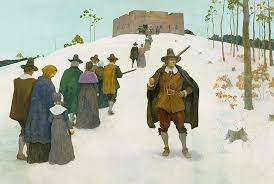
Colonial New England was settled in large part by Puritans. They even extended their influence to areas that they did not initially settle. They went so far as to banish, and in some cases even execute people who did not agree with them. They were determined to create a society dominated by Puritan beliefs.
The Puritans did not favor Christmas celebration; they believed there was no scriptural basis for acknowledging Christmas beyond doing so in prayer. In 1621 Governor William Bradford of Plymouth Colony criticized some of the settlers who chose to take the day off from work because as Puritans he felt that they could best serve God by being productive and orderly.

The celebration of Christmas was outlawed in most of New England. Calvinist Puritans and some other protestants abhorred the entire celebration and likened it to pagan rituals and “Popish” observances. In 1659, the General Court of Massachusetts forbade, under the fine of five shillings per offense, the observance “of any such day as Christmas or the like, either by forebearing of labour, feasting, or any such way.” The Assembly of Connecticut, in the same period, prohibited the reading of the Book of Common Prayer, the keeping of Christmas and saints’ days, the making of mince pies, the playing of cards, or performing on any musical instruments. These statutes remained in force until they were repealed early in the nineteenth century.
It is important to note that Puritan hostility to Christmas was not because they did not believe in the divinity of Jesus Christ. They objected to the way the holiday was being celebrated. They disliked the excesses of Yuletide festivities in England. Christmas had become a time for the working class to drink, gamble, and party. The Puritans would not tolerate any sign of disorder and believed that it was an affront to God.
They tried to protest Christmas revelries while still living in England but had little impact. Once they moved to the New World where they were able to exert control, they would not condone any form of excess. Except, perhaps, an excess of piety and self-righteousness.
Any form of Christmas observance that did occur took the shape of fasting, prayer, and religious service. Even the famous New England cleric Increase Mather loathed Christmas and believed the holiday was derived from the excesses of the pagan Roman holiday Saturnalia. We shouldn’t think that Mather was completely humorless; he once called alcohol. “a good creature of God “. Drinking wasn’t bad, but like all things it must be done in moderation with complete self-control. That’s probably good advice for everyone, whether they’re a Puritan or not.
Middle Atlantic Colonies
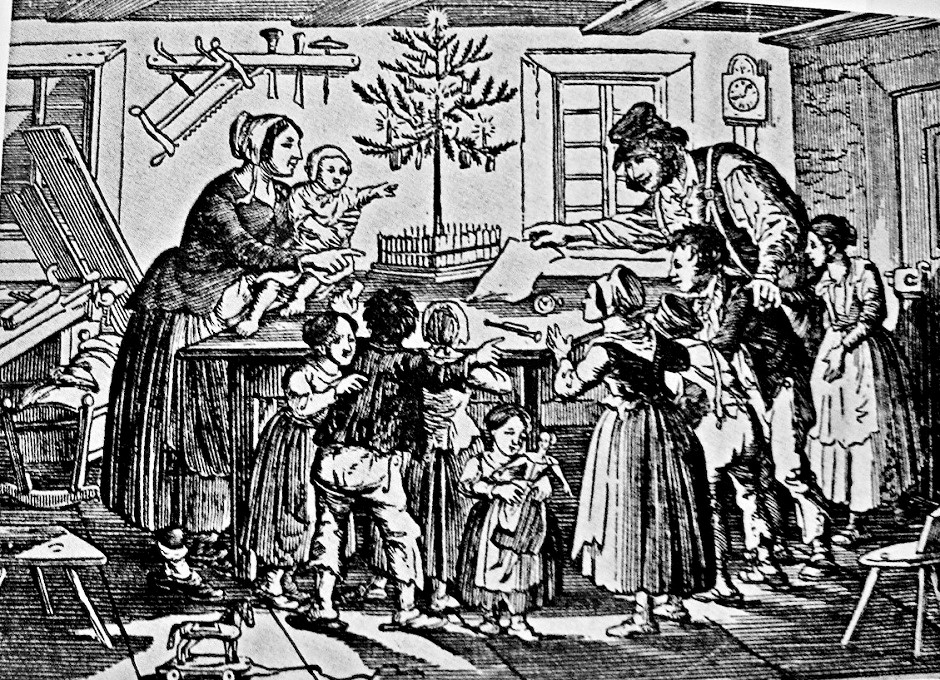
Many of the traditions that we now consider part of the American Christmas have their origins in the middle Atlantic colonies, most notably in Pennsylvania. Many of these were brought by settlers of German heritage as well as some traditions brought by the Scots and the Dutch.
In Pennsylvania there were two quite different Christmas traditions, one of the protestant groups and another of the Quakers. They differed considerably in their approach to Christmas.
Some colonists celebrated Christmas by importing English customs such as drinking, feasting, mumming and wassailing. Mumming involved wearing masks and costumes and going door-to-door singing carols or performing short plays in exchange for food or drink. Wassailing was a tradition where people would go from house to house singing carols and drinking toasts to the health of their neighbors. Some non-Puritan New Englanders also continued these traditions but kept them private to avoid attracting the attention of the Puritan officials.
Many of the Christmas traditions that we think of as being a quintessentially American are derived from the settlers of German descent who were known as the Pennsylvania Dutch. These include celebration of the advent season, the decoration of the Christmas tree, singing of Christmas carols, the display of nativity scenes, and the exchange of gifts on Christmas Eve or Christmas morning. We can’t imagine Christmas without these things, but we seldom remember that it was our German American ancestors who gave us these wonderful traditions.
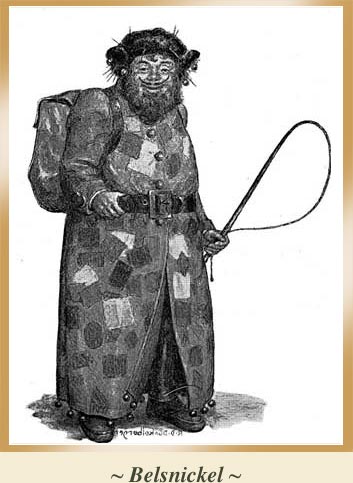
To me the most interesting and probably most significant tradition passed on by the Pennsylvania Dutch was what led to our current concept of Santa Claus. During the colonial period, they had the tradition of Beltznickle. He is depicted as a man wearing furs and a mask and having a long tongue. He’s usually shown as being very ragged and wearing dirty clothes. He had a pocketful of cakes, candies and nuts for good children, but he also carried a switch or a whip with which to beat naughty children. Beltznickle took the naughty and nice list very seriously.
He was a long way from Clement Clark Moore’s jolly old elf in ‘Twas the Night Before Christmas and the jovial Santa Claus that we know today from the original Coca-Cola ads of 1930.

Quakers had a much different approach to Christmas. They did not celebrate it at all. It is not that they were opposed to Christmas as were the Puritans. It’s just that they did not celebrate any holidays, Easter, birthdays or any other holidays. They had no set liturgical calendar, so they did not have an advent, or an Easter season or any other religious holiday. There is no central Quaker authority to set beliefs or doctrines. Each Quaker is free to decide how to observe religious traditions. They focus on spiritual reflection and social justice.
Non-Quakers did not always understand their religious beliefs or practices. Here is an example of how Quaker practices were seen by outsiders. Swedish naturalist Peter Kalm visited Philadelphia in 1747 and recorded the following observation in his diary:
Christmas Day. . . .The Quakers did not regard this day any more remarkable than other days. Stores were open, and anyone might sell or purchase what he wanted. . . .There was no more baking of bread for the Christmas festival than for other days; and no Christmas porridge on Christmas Eve! One did not seem to know what it meant to wish anyone a merry Christmas. . . at first the Presbyterians did not care much for celebrating Christmas, but when they saw most of their members going to the English church on that day, they also started to have services.
Apparently, Presbyterians were much quicker to adopt popular practices then were the Quakers.
Southern Colonies

Celebration of Christmas was similar throughout all of the southern colonies. We’ll consider Colonial Williamsburg as a proxy for the rest of the southern colonial region. This is largely because there is more information available about Williamsburg than other areas and because it represented what was the majority of practices at the time. The major religion of the southern colonies was Church of England and they followed those practices.
Religious services were a central part of their celebration. The majority of the religious observances were during the advent season, the four weeks leading up to Christmas which were a period of reflection on the significance of the coming of Christ. The southern colonies usually held Christmas Eve services although occasionally Christmas Day services were held. Christmas Day was considered a day of celebration and family feasting.
It should be noted that the Christmas celebration was only for the white population. If the enslaved people received a holiday for Christmas, it was only because the weather was too bad to work in the fields. And of course, the house slaves were expected to attend to all the needs of the Christmas celebration.

Margie and I decided to visit Colonial Williamsburg in December of 2019, the period we refer to as BC (before COVID). We’ve always had a special affinity for Williamsburg because that’s where we spent our honeymoon 52 years ago. I’m not sure exactly what I was expecting, perhaps a large inflatable George Washington holding a Christmas wreath. But it was much more understated than what I had anticipated.
According to our tour guide, even those low-key decorations were probably more than would have been evident in the colonial era. People typically decorated their homes on the day before Christmas and removed the decorations the day after Christmas. Decorations were usually limited to candles in the window and pine boughs on the tables and mantle pieces. Pine boughs were used to decorate the church in what was known as “sticking the church”.
At Colonial Williamsburg we saw many displays that included fresh fruits and pineapples. Our tour guide told us that those were too precious to actually have been used as decorations and might have been included as part of a table display to be consumed during the Christmas feast. Some people would even rent a pineapple to display on their table as a sign of their wealth.
The first Christmas tree did not make its appearance in Williamsburg until 1848.
The southern colonists were very social people. They enjoyed wassailing as did the people of the mid Atlantic colonies. They also considered Christmas as a time for feasting, dancing, and celebrations. Men of the upper class celebrated Christmas with fox hunts and other outdoor activities. Men of the working classes frequently celebrated Christmas with shooting matches and drinking parties. Women, of course, were expected to stay at home and prepare the meals. Christmas Balls were a common practice among the upper class of the southern colonies. They were often elaborate and included large banquets with musicians, dancing and occasionally masquerades.

Present exchange was not standard practice in the southern colonies. However, it was common to give children small presents of nuts, fruit, candy, and small toys. Adults generally did not exchange presents.
Virginian Phillip Fithians writing in his journal in 1773 gave the following description of a gather just before Christmas: When it grew to dark to dance. . . . we conversed til half after six; Nothing is now to be heard of in conversation, but the Balls, the Fox-hunts, the fine entertainments, and the good fellowship, which are to be exhibited at the approaching Christmas.
Life in colonial America could be hard, but that did not stop them from having a joyous Christmas celebration.



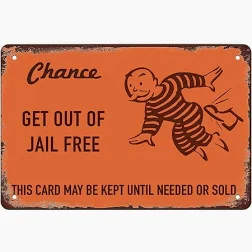



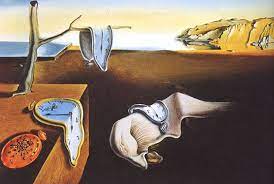

A Time For New Year’s Resolutions
By John Turley
On December 31, 2023
In Commentary, Humor
New Year’s resolutions aren’t as popular as they used to be, but this is the time of year when we start thinking about all the things we should do, all the things we want to do and all the things we probably won’t do. But wouldn’t it be nice if we could just enroll in a simple, study at home course to gain all those longed for skills?
With that in mind, I’m going to share with you the Adult Self Education Course Catalogue from the Institute for Advanced Self-Delusion. An earlier version was shared with me by my friends Jane and Leigh. Alas, the original author is unknown. I have taken that original and made additions, deletions, and revisions, all to meet my personal needs for self improvement.
Adult Self Education
Institute for Advanced Self-Delusion Course Catalogue
Self-Improvement
SI 101 Creative Suffering
SI 102 Overcoming Peace of Mind
SI 103 Singing for the Tone Deaf
SI 104 Guilt as a Lifestyle
SI 105 The Primal Shrug
SI 106 Ego Gratification Through Apathy
SI 107 Molding Your Child’s Behavior Through Guilt and Fear
SI 108 Dealing with Post Realization Depression
SI 109 Whine Your Way to Alienation
SI 110 How to Overcome Self-doubt Through Pretense and Ostentation
SI 111 Finding Contentment Through Willful Ignorance
Business and Career
BC 101 How I turned a $50,000 Investment into $100 Through Real Estate
BC 102 Money Can Make You Rich
BC 103 Financial Opportunities from Unsolicited Emails
BC 104 Selling Your Unneeded Organs for Profit
BC 105 Underachiever’s Guide to Very Small Business Opportunities
BC 106 Tax Shelters for the Bankrupt
BC 107 Panhandler’s Guide to American Cities
BC 108 Flatulence for Fun and Profit
Arts and Crafts
AC 101 Self-Actualization Through Macramé
AC 102 Cuticle Crafts
AC 103 Bonsai Your Pet
AC 104 Cheap Gifts for the Ungrateful
AC 105 Abstract Stick Figures for the Untalented
AC 106 1001 Uses for Cat Hair
Home Economics
HE 101 Convert Your Vacuum Cleaner into an Automatic Weapon
HE 102 Convert Your Family Room into a Garage
HE 103 Burglar Proof Your Home with Concrete
HE 104 Convert Your Wheelchair into a Dune Buggy
HE 105 How to Tell If Your Smart TV Is Spying on You
HE 106 The Paranoid’s Guide to Alexa
HE 107 Landscaping: An Expensive Way to Feed the Deer
Health and Fitness
HF 101 Creative Tooth Decay
HF 102 The Complete Guide to Sinus Drainage
HF 103 Exorcism and Acne
HF 104 Joys of Hypochondria
HF 105 Living the High Fiber Life
HF 106 Biofeedback and How to Stop
HF 107 Skate Your Way to Regularity
HF 108 Tap Dance Your Way to Social Ridicule
HF 109 Optional Body Functions
HF 110 Why Do Smart People Do Stupid Things and Can They Be Cured?
HF 111 1001 Delicious Recipes for Kale (Never Mind, I Can’t Find Any)